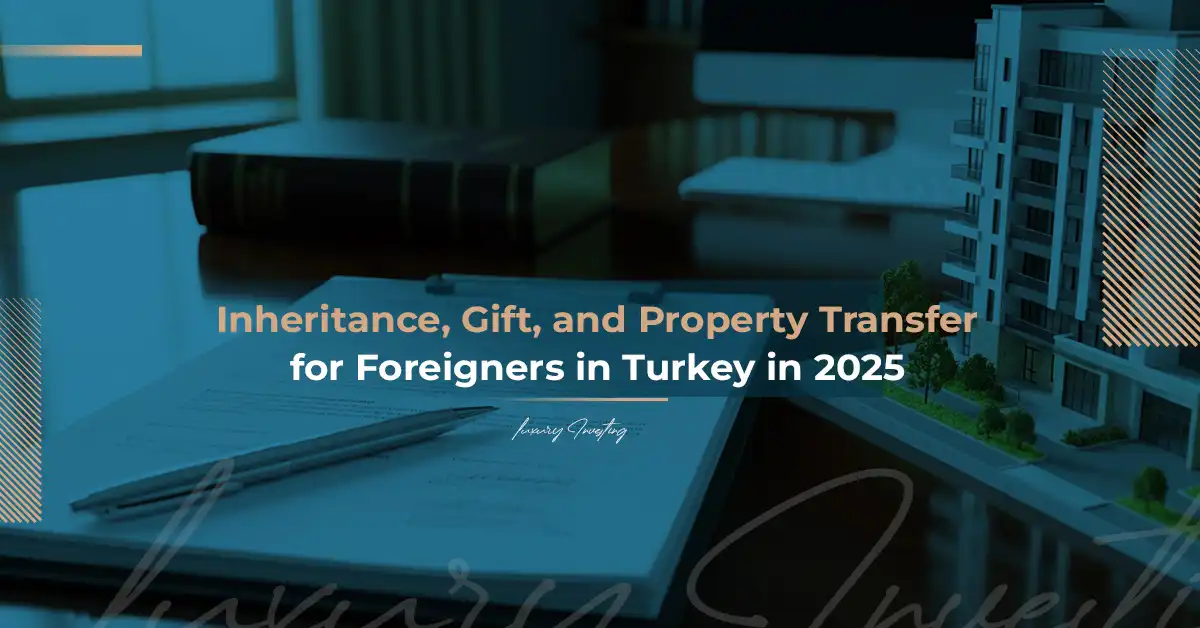
Inheritance, Gift, and Property Transfer for Foreigners in Turkey in 2025
Table of Contents
As international investors continue to show growing interest in the Turkish real estate market, important questions arise regarding how property ownership is handled after the owner’s death, or how property can be gifted or transferred within families — along with the taxes that apply in each case.
This comprehensive legal guide from Luxury Signature provides a detailed overview of the laws and regulations governing inheritance, gifting, and property transfer in Turkey in 2025, complete with real-life examples and practical advice to help investors make informed and secure decisions.
-
Real Estate Inheritance in Turkey
Property inheritance in Turkey is governed by the Turkish Civil Code (Türk Medeni Kanunu), which states that all real estate located within Turkey is subject to Turkish inheritance law, regardless of the owner’s nationality.
This means the division of the estate and identification of heirs follow the Turkish family hierarchy system.
Heirs are classified into three main degrees:
- First degree: children and spouse.
- Second degree: parents and siblings.
- Third degree: grandparents and their descendants.
If no heirs exist, ownership passes to the Turkish Treasury (Hazine’ye geçer).
Foreign heirs are required to provide:
- Original death certificate (translated and notarized).
- Certificate of inheritance (Miras Belgesi).
- Passports or ID cards of the heirs.
- Tax number for each heir.
- Original title deed (Tapu).
Inheritance tax (Veraset Vergisi) in Turkey ranges between 1% and 10% depending on the property’s value and the degree of kinship — typically 1–3% for first-degree relatives.
Real Estate Inheritance for Foreigners in Turkey
-
Property Gift (Bağış)
Gifting property is a common practice among family members — particularly between parents and children — to simplify inheritance procedures or reduce tax liability.
A gift agreement is signed and notarized at the Turkish Notary (Noter) and officially registered at the Land Registry Office (Tapu Dairesi).
The key difference between a gift and a symbolic sale is that a sale is treated as a commercial transaction subject to a 4% title deed fee, while a gift is subject to a lower donation tax (Bağış Vergisi) of only 1–3%.
Required documents for a property gift:
- Original title deed.
- IDs or passports of both parties.
- Property valuation report.
- Tax numbers for both parties.
- Notarized gift contract.
-
Property Transfer (Tapu Devri)
A property transfer refers to the formal change of ownership to another person — whether free of charge or for a symbolic payment.
If registered as a formal sale, a 4% title deed fee applies; if recorded as a free gift, only the gift tax (1–3%) is payable.
Types of property transfers:
- Sale Transfer (Satış Devir): subject to 4% title deed fee.
- Gift Transfer (Bağış): subject to 1–3% donation tax.
- Family Transfer (Parent ↔ Child, Spouse ↔ Spouse): minimal symbolic tax.
-
Taxes and Fees in These Cases
Real estate taxes in Turkey vary depending on the type of transaction:
- Inheritance: 1–10% depending on kinship degree.
- Gift: 1–3%.
- Official sale/transfer: 4%.
Taxes are calculated based on the official municipal value (belediye değeri) rather than the market value.
Example:
If a property is worth ₺10,000,000 and gifted from a father to a son, the payable tax would be approximately ₺100,000–₺200,000 only.
-
Frequently Asked Questions (FAQ)
Can a minor own property in Turkey?
Yes. The property can be registered under a child’s name, but all signatures and management must be handled by their legal guardian.
Can a Syrian citizen inherit property in Turkey?
Not directly. Only if the person holds dual citizenship or owns the property through a Turkish-registered company.
Can a property be gifted between foreign spouses?
Yes. It is allowed and subject to a symbolic tax of no more than 1%.
How long does the ownership transfer process take?
Typically 2–5 business days after all documents are submitted.
Is a symbolic sale recommended to avoid taxes?
No. Symbolic sales are still subject to the same 4% title deed fee. A legal gift procedure is the more tax-efficient option.
-
Expert Tips from Luxury Signature
- Always consult a qualified lawyer before any transfer or gift transaction.
- If heirs have different nationalities, confirm the applicable nationality for inheritance.
- Use official gift contracts to minimize tax exposure.
- Obtain an official valuation report before any transaction.
- Keep all bank receipts and notarized documents for legal protection.
Conclusion
Understanding the rules of inheritance, gifting, and property transfer in Turkey is essential to avoid legal or financial complications.
Luxury Signature provides this guide as a reliable resource to help foreign investors and residents manage their real estate assets confidently and in full compliance with Turkish law.
For personalized legal assistance, please contact our expert legal team directly through Luxury Signature.
Frequently asked questions
Real estate inheritance in Turkey is governed by the Turkish Civil Code (Türk Medeni Kanunu), which applies to all real estate within Turkish territory regardless of the owner's nationality.
Heirs are determined in three degrees:
Children and spouse.
Parents and siblings.
Grandparents and grandchildren.
If there are no heirs, ownership reverts to the Turkish state.
It ranges from 1% to 10% depending on the property's value and the degree of kinship, and is generally 1–3% for first-degree relatives.
Sale transfer (Satış Devir): Subject to a 4% fee.
Gift transfer (Bağış): Subject to a 1–3% fee.
Family transfer (husband ↔ wife or parent ↔ child): Very nominal fee.
Yes, the property can be registered in the child's name, but the signature and management must be done by their legal guardian.
The process usually takes between two and five business days after all required documents have been submitted in full.








